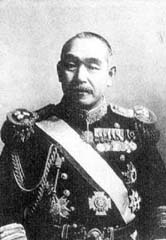reclusive and hardworking, leader from 1932 to 1968,was the mildest of European dictators; a former economics professor, skillfully maintained neutrality throughout the war, though both the Germans and the Allies used tungsten and wolfram from Portuguese mines, while Portugal's alliance with Britain, which dated to 1386, remained intact; eventually recognized the need to favor the Allies and granted the United States base rights in the Azores in 1943; Portugal was a haven for refugees and Lisbon a hotbed of Allied and Axis espionage.
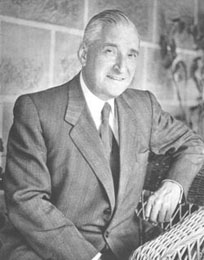
Reich Director of Labor from 1942 to 1945, by whose orders 5 million people ere deported from occupied Europe to work as slaves in Germany; one of the early members of the Nazi Pary, was given responsibility for mobilization of labor to support Speer's armaments and munitions production program in a Hitler decree of March 1942; teams under his direction abducted men and women from all over Europe, including allied Italy; was found guilty of crimes against humanity at Nuremberg and hanged.
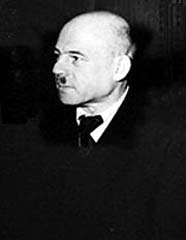
Hitler's last appointment as field marshal and the man chosen to command the Army in Hitler's las political testament, made only ten days before his suicide; his non-aristocratic background and ostentatious acceptance of Nazism won him rapid promotion during the war; in March 1944 was sent to the Eastern Front and given command of Army Group South in the Ukraine and later Army Group North and Army Group Center in January 1945, by then a largely fictitious army; accepted his final promotion and command of the non-existent army before fleeing to escape the US Army; handed over by them to the Russians, was imprisoned for ten years; was subsequently sentenced to a further term by a West German court, on charges of harsh disciplinarianism, which had included the summary execution of German soldiers.
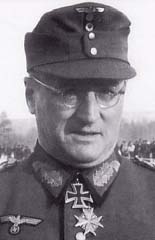
British commander who directed Allied forces in Burma through bitter fighting in the campaign to recapture Indian and Burmese territory from Japanese forces during 1944; a member of the General Staff at Allied headquarters in India betwen 1939 and 1941, was next appointed Director of Military Operations and Intelligence; transferring in July 1942 to command the IV Corps at Imphal in Assam, near the Burmese border, came under the command of US General Stilwell in the newly organized Southeast Asia Command (SEAC) at the end of 1943; in January 1944, a planned offensive by IV Corps across the Chindwin River into central Burma had to be hurriedly revised when intelligence indicated an imminent Japanese offensive there; in a courageous plan to defuse the assault, made a dramatic and dangerous strategic withdrawal of his forces to the Imphal plain, where they made a convincing stand against Mutaguchi's 15th Army; after five weeks of dogged and ferocious fighting during March and April 1944, the 15th Army was forced to withdraw from lack of supplies; this success made a firm contribution to the later, decisive Allied victory in the Imphal offensive; in December, was appointed GOC Central Command, India and was knighted for his services, along with Generals Christison, Slim and Stopford.
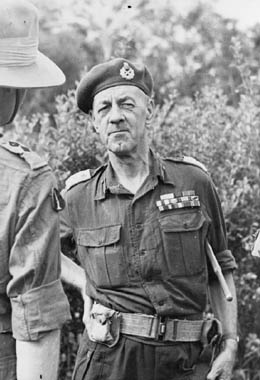
nickname 'Lion of Judah'; a feisty emperor, was an early hero in World War II; after Italian forces invaded his country in 1935, fled to England and made a futile plea to the League of Nations; remained in exile until 1940 when, with the entry of Italy into World War II, Britain agreed to help restore him to the throne; formed a patriot army in the Sudan, and, aided by guerrilla brigade leader Orde C. Wingate and British units advancing from Somaliland and Eritrea, reentered his capital, Addis Ababa, in May 1941; stabilized his government and joine the United Nations; was deposed by Marxists in 1974 and died the following year in prison, most likely at the hands of his captors.
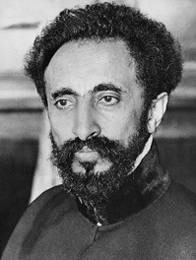
one of the war's best commanders at the division and corps levels; directed the crack 17th Panzer Divsion in it abortive attempt to relieve Stalingrad in 1942; skillfully conducted the extrication of German forces from Sicily in the summer of 1943; led the XIV Panzer Corps in Italy, distinguishing himself by his stubborn defense of the Monte Cassino sector early in 1944.
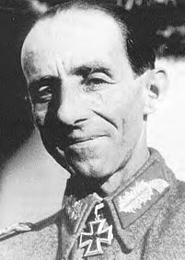
Viennese lawyer, covert supporter of the Austrian Nazi Party and advocate of the Anschluss; acted as a German 'Fifth Column' from his position as Austrian state councillor, not emerging publicly as a Nazi supporter until appointed Minister of the Interior by Chancellor Schuschnigg in 1938 on Hitler's insistence; after the Anschluss, served as Chancellor of the now renamed state of Ostmark; served as Reichskommissar for the Netherlands where he earned the hatred of the Dutch for the brutality of his regime; repented after 1945 for the fearful excesses of Nazism but was sentenced to death and hanged at Nuremberg.
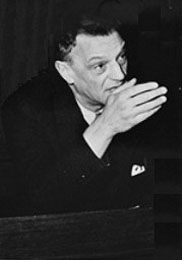
highly regarded Russian military theorist and member of Stavka, was thought to have been Stalin's chief military adviser before the war, and as such one of the few high-ranking officers to survive the purges ot 1937-8; appointed Chief of the General Staff in 1937, was forced to resign, apparently due to ill health, in 1940 (though this may have resulted from a disagreement with Stalin over defensive strategy); reappointed to the post in July 1941 following the German invasion, his recommendations of withdrawal wer unwelcome to Stalin; in November, was replaced by Gen Vasilevsky, and ill health now prevented him from further active involvement in the war, although he remained as Commandant of the Voroshilov Military Academy until his death.
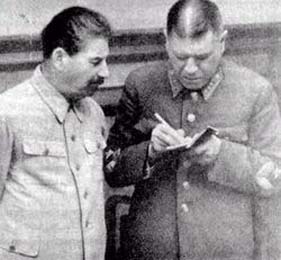
experienced Japanese diplomat and politician who served on the 'surrender cabinet' and in Prince Higashikuni's first post-war cabinet; Japan's ambassador to China from 1931 to 1933, served as Vice Minister of Foreign Affairs from 1933 to 1936 and then went to Moscow as ambassador until 1938, when he was appointed ambassador to London; his undoubtedly sincere attempts to reassure British political leaders that Japan's alliance with Germany in the Tripartite Pact did not represent a threat of war between Japan and the Allies were totally undermined by the Japanese attack on Pearl Harbor, which pre-empted further discussion; two days after the attack, was sent to Nanking as ambassador to the puppet regime led by Wang Ching-wei; was a firm opponent of the colonization of Chinea; preferring a 'good neighbor' policy based on mutual co-operation rather than military occupation, sought to persuade Japanese political leaders to abolish the unequal treaties with Nanking and offer economic aid without restrictions; his influence with the Japanese Premier Togo led to his recall to Tokyo to become Foreign Minister in April 1943, where he continued to campaign for political freedom for the nations of East Asia; following Japan's surrender, which he signed as head of the delegation aboard the USS Missouri on September 2, 1945, was convicted of war crimes by the International Military Tribunal for the Far East and served seven years imprisonment; later served again as Foreign Minister (1954-56) and helped to negotiate Japan's entry into the United Nations.
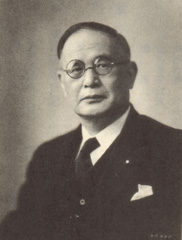
was the Army commander in Hawaii at the time of the attack on Pearl Harbor on December 7, 1941; along with Admiral Husband Kimmel, was held responsible for the lack of preparedness and was recalled 10 days after the attack.
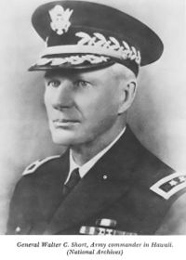
Polish general and statesman, Premier of the Polish government-in-exile and C-in-C of Free Polish forces; a leader of the Polish nationalist movement before World War I, served as Premier, Interior Minister and War Minister of Poland during the 1920s; when Poland was invaded by Germany and the Soviet Union in September 1939, was refused a command by the military regime in Warsaw under Smigdly-Rydz, who had inherited his predecessor Pilsudski's distrust of Sikorski.
Following the collapse of Poland, however, was named Premier of a Polish government-in-exile in Paris, where he recruited approximately 100,000 Polish troops to join Allied forces fighting in various theaters; after the fall of France in 1940, the exiled government based itself in London; from her, in June 1941, was responsible for the negotiation of a collaboration agreement with the Soviet Union that won important concessions for Poland, including the invalidation of the Russo-German partition of Poland and an amnesty for Polish prisoners in Russia.
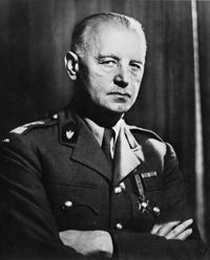
soldier, politician and Serbian nationalist; in 1940 was Chief of the Yugoslav Air Force and his headquarters at Zenum became a focus for anti-German activities in the Balkans; in February 1941 warned the Regent, Prince Paul, against bowing to pressure from Hitler to join the Tripartite Pact; on March 27, two days after the Yugoslav government had signed an agreement with the Axis, led a bloodless overnight coup in Belgrade, installing King Peter II on the throne; Germany invaded on April 6 and armed resistance collapsed in a few days; fled with the King, and became head of the exiled royal government in London, a position he resigned in 1942; in early 1945, Tito vetoed his appointment to the proposed regency council and in May of that year returned to retirement in Yugoslavia.
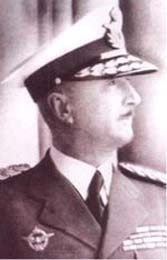
nickname 'Big Simp'; able led the US 9th Army through the Brest, Lorient, Orl&eaute;ans actions in France and the Rhine and Ruhr campaigns in Germany in 1944-45.
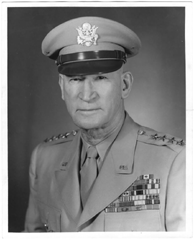
British Air Ministry Director of Plans at the outbreak of war; took part in the Anglo-American staff discussions in Washington in 1941 that first formulated the 'Europe First' strategy in the event of American entry into the war; after commanding the No. 5 Bomber Group became AOC-in-C RAF Coastal Command, working closely with the Royal Navy and US naval forces to improve decisively the effectiveness of his forces against German U-boats in the Battle of the Atlantic; from January 1944, commanded RAF units in the Mediterranean with equal ability, and later becam Deputy C-in-C Allied Air Forces in that theather; in 1950 became Chief of the Air Staff.
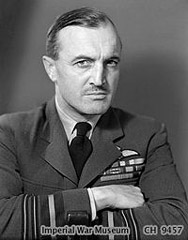
highly respected and able British field commander, commanded a brigade in Sudan and Eritrea before being wounded; on his return to active duty was transferred to command the 10th Indian Div for the Iraq revolt and the campaign in Syria; promoted to lieutenant-general in 1942, was appointed by Gen Wavell, Commander in Chief India, to command the I Burma Corps at the height of the Japanese offensive to capture Burma; after attempting unsuccessfully to regain the offensive in central Burma during April, managed against all the odds to withdraw his depleted and demoraized forces 900 miles back into India, where he was transferred to command XV Corps, directing intensive training in guerilla and jungle tactics, as well as morale building. Appointed commander of SEAC's newl formed 14th Army in October 1943, made a significant contribution to the achievement of the Allied victory in Burma; on the offensive from December 1944 in Operation CAPITAL, his 14th Army crossed the Chindwin River and fought steadily south with extraordinary tenacity, against fanatical resistance from defending Japanese forces; early in 1945 the 14th Army advanced across the Irrawaddy, taking Mandalay by late March and the capital Rangoon, in May; in the retreat, Japanese forces lost nearly 350,000 ment; considered by some historians as the greatest land victory achieved against the Japanese forces during the war, the 14th Army's victory in Burma led to his appointment as C-in-C of Allied Land Forces in Southeast Asia and his promotion to full general in August 1945, just before the Japanese surrender; appointed Chief of the Imperial General Staff after the war, later served as Governor-General of Australia.
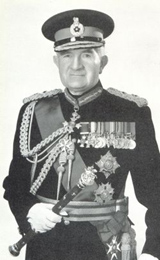
Marine commander of the US V Amphibious Corps and widely regarded as one of the founders of the American system of amphibious warfare, was a tough and uncompromising commander who led successful Marine island assaults throughout the Pacific War; the headquarters of the redesignated V Amphibious Corps (VAC) was set up at Pearl Harbor in September 1943 under him and planning for the invasion of the Gilberts, the Marshalls, Saipan, Tinian and the Marianas was directed by him from there; during the Saipan operation, earned unfavorable notoriety as the initiator of a bitter controversy between the Army and Marine Corps by dismissing the 27th Inf Div commander, Ralph Smith, for poor performance. In August 1944, took over command of the newly established Fleet Marine Force with nominal authority as Pacific Fleet Commander Adm Nimitz's chief Marine adviser; in July 1945 was recalled to the United States to a training command, and retired in May 1946.

rose through the army ranks to become secretary of the Allied Combined Chiefs of Staff and General Dwight D. Eisenhower's chief of staff; negotiated the Italian armistice in 1943; arranged the German surrender in Northwest Europe in 1945.
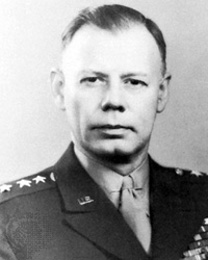
South African soldier and statesman who had become a convinced supporter of the British Commonwealth and Empire after leading Boer commandos against the British in his native Cape Colony at the turn of the century; had served in the Imperial War Cabinet in the last years of World War I and was Prime Minister of the Union of South Africa 1919-24; returned to office in 1939 on the issue of immediate entry into World War II, which he supported while the supported while the previous Prime Minister (Gen Herzog) remained committed to neutrality. South African support was of great value to the British war effort; units of the South African army - in which all combat troops were whites - fought in East Africa, the Desert War, Tunisia and Italy; the South African Air Force, British equipped, played a significant army support role in East Africa; despite active and growing opposition to the war at home, he himself retained his long-standing intimacy with Winston Churchill and exercised considerable influence in London over African strategy; was created field marshal in 1941, and visitid Britain 4 times during the war, as well as taking part in the Cairo Conference on November 1943; at the end of the war played a major role in the drafting of the UN Charter at the San Francisco Conference; was the only man to take part in the peace conferences at the end of both world wars; was also a respected botanist and philosopher, becoming Chancellor of Cambridge University in England after his defeat in the South African elections of 1948.
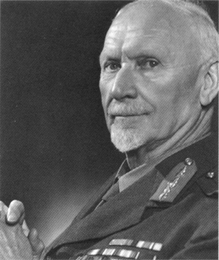
commander of Soviet forces in Germany after the war; was Chief of Staff of the Russian Western Front under Konev 1941-3 and Chief of Staff of the 1st Ukrainian Front 1944-5.
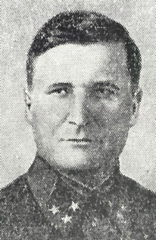
had been invalided out of the Royal Navy in 1939 while serving as C-in-C, East Indies; fully recovered and unemployed, assisted Admiral Ramsay at Dover in a voluntary capacity during the evacuation of Dunkirk; in June 1940 took command of Force H based in Gibraltar; remained in this demanding post until March 1942, when transferred to command the hastily created Eastern Fleet in the Indian Ocean; was a highly successful surface commander, but retired from active service in 1944 when he became head of the British naval mission in Washington, a post he held as an Admiral of the Fleet when the war ended.
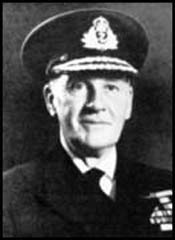
German journalist and spy for the Soviet Union; entering the Soviet Secret Service in the 1920s, first travelled extensively as a Comintern agent, with assignments in Europe and Asia; in 1933 went to Japan under cover as a loyal German correspondent for the Frankfurter Zeitung, gaining the confidence of the German ambassador, whose embassy became a key source, and passing secret German and Japanese strategic information to his Red Army superiors over a period of eight years; was able to inform Stalin of the impending German invasion and, perhaps even more importantly, of the improbability of a Japanese incursion into Siberia, allowing troops to be withdrawn in 1941 for the pivotal defense of Moscow; was arrested on October 16, 1941 to the obvious surprise of German embassy staff, interrogated at length, and finally hanged by the Japanese in 1944.
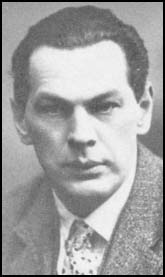
eminent US air commander who held high command positions in both the Pacific and European theaters; American Chief of the Air Staff when Japan attacke Pearl Harbor, had been an official air observer in London during the Battle of Britain and was appointed to command the 8th Air Force there in June 1942; while the 8th Air Force flew daytime bombing missions as part ot the Strategic Bombinv Offensive from January 1943, his command was extended first to the 12th Air Force fighting in the Desert War and then to command of the Northwest African Air Forces which supported the Allied offensives in Tunisia, Sicily and Italy. Promoted to lieutenant-general in March 1943, became Deputy Commanding General, Mediterranean Allied Air Forces for a short period before returning to Britain in January 1944 to co-ordinate the 8th Air Force, based in England, and the 15th Air Force, based in Italy under the aegis of the newly formed USSAFE (US Strategic Air Forces in Europe). With the planning for the invasion of Normandy, Operation Overlord, now well advanced, came into conflict with Leigh-Mallory, Commander of the Allied Expeditionary Force, and Air Marshal Tedder, Eisenhower's deputy over the strateic role of the Allied air forces for the coming invasion of Northwest Europe; nevertheless, his formations played an important part in the success of the air offensives against German communications and installations in the second half of 1944. Returning briefly to the United States to collect his fourth star, hwas transferred to Guam to command US Strategic Air Forces Pacific (8th and 29th Air Forces) and directed the final stages that culminated in the missions on Hiroshima and Nagasaki.
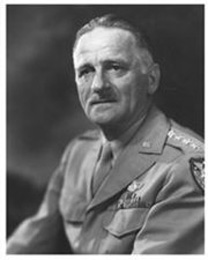
Reich Minister for Armaments and Production 1942-5 and one of the most able men to serve Hitler; was trained as an architect, joined the Nazi Party in 1932 and the SS shortly afterward; first attacted Hitler's attention for the technical arrangements he made for a Berlin Party rally in May 1933; asked to provide a spectacle for the 1934 Nuremberg Rally, his success resulted in his appointment to Deputy Führer's Hess Staff where his main responsibility was to design the 25 'reconstruction cities' in the Reich; also worked with Hitler on grandiose schemes for the Reich Chancellery in Berlin and the Party Palace at Nuremberg; his celebrated metamorphosis into Armaments Controller resulted from the death of the Minister, Dr Todt, in February 1942; appointed in his place, proved himself an exceptional administrator, raising production levels to previously unattained heights; by 1944, however, his commitment to Nazism had declined and he had realized, like other senior Nazis, that an end to the war must now be sought; nevertheless, remained in his post until April 1945; arrested by the British at Flensburg in May, stood trial at Nuremberg, pleading guilty to charges of war crimes and crimes against humanity (committed against the slave labor used for his production programs), for which he was sentenced to 20 years imprisonment; during his imprisonment wrote his autobiography, Inside the Third Reich, published in Germany in 1969, and in English in 1970; it still provides one of the most complete and authorative descriptions available of the processes of government in the Nazi state.
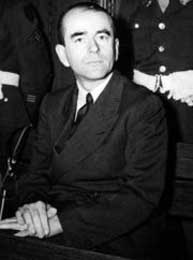
served with the German 6th Army in France in 1940; acted as chief of staff to the military governor of Paris; spent 2 years on the Russian front; returned to France as chief of staff of Rommel's Army Group B; part of the officers' conspiracy against Hitler, tried unsuccessfully to win over Rommel.
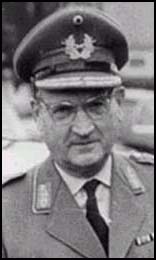
a German flight commander in World War I; remained in the post-Versailles German Army and was transferred to the newly formed Luftwaffe in 1935; was the first commander of the Luftwaffe force sent to aid the nationalist side in the Spanish Civil War; from January 1939 commanded Luftflotte III, the air army stationed in Northwest Europe, which he led through the Battle of Britain in 1940 gaining promotion to field marshal; except for a brief tour in North Africa, remained in western Europe until he was retired in 1944, after the Allied invasion of Normandy had overrun Luftflotte III; although knowing of the July Bomb Plot against Hitler that year, and was in Paris at the time, was not suspected of complicity with the conspirators; Hitler liked to have him present at difficult meetings as one of his 'two most brutal looking generals' (the other was von Reichenau), and was generally respected more for his intimidatory qualities than for any great military acumen; stood trial for war crimes at Nuremburg, but was acquitted and eventually freed in November 1948.

became the most effective American carrier commander of the Pacific war; assumed tactical command at the Battle of Midway (1942) and inflicted a crushing defeat on the Imperial Japanese Navy; late led offensive operations against the Gilbert and Marshal Islands and was in command of US naval forces during the Battle of the Philippine Sea.
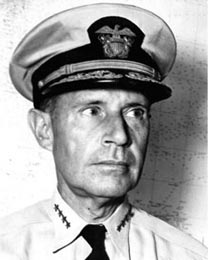
Roosevelt called him 'Uncle Joe' and tried to reason with him, but the Soviet Union's 'Man of Steel' was one of the most cunning and ruthless leaders in history; after have outmaneuvered his opponents in the Soviet government following Lenin's death in 1924, soon gathered all power in his hands by a willingness to use breathtakingly brutal tactics; millions of opponents, real or imagined, were executed of sent to exile in work camps in Siberia; in the 1930s purged additional millions, including the top echelons of the Soviet armed forces, leaving the military dangerously weakened in it forthcoming confrontation with German; his cold brutality summed up in his own words, 'One death is a tragedy; a million deaths is a statistic.'; had ignored warnings from Churchill that the Nazis were preparing to invade the Soviet Union, having considered the warnings a British plot to drive a wedge between the Soviet Union and Germany; after a series of early disasters, rallied the Russian people to super human effort and built up his forces dramatically by moving armaments production east of the Urals; his armies waged several great counter-offensives that were aided by the bitter Russian winters and ultimately broke the German army; received massive amounts of aid from Britain and the United States, but remained suspicious of the Allies' motives throughout the war; pressured the British and Americans to open a second front long before they were capable of it; at times, threatened to make a seperate peace with Hitler; as his soldiers battered their way into Berlin, turned his attention to spreading his remorseless, totalitarian regime across all of Eastern Europe; died of a cerebral hemorrhage in 1953.
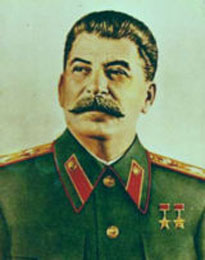
nickname 'Betty'; a friend of President Franklin D. Roosevelt; served in London during both world wars; became chief of naval operations in 1939; placed the US Navy on a war footing when relations with Japan deteriorated in 1940-41; from March 1942 commanded US naval forces in Europe, readying them for the Normandy landings.
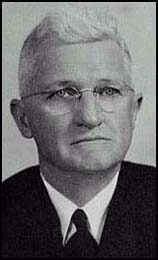
the officer who placed the bomb for the attempt on Hitler's life at Rastenberg on July 20, 1944; fiercely anti-Hitler in his views, von Stauffenberg joined the opposition through the Kreisau Circle; but by early 1944, was exasperated by the lack of action among the many groups that composed the aristocratic and military opposition to Hitler and assumed a leading role in a new plot to tak the dictator's life that was to combine an assassination with a military takeover of Berlin code-named Operation VALKYRIE; the failure of the July Bomb plot in 1944 resulted in his execution by shooting after summary court martial on the evening after the explosion.
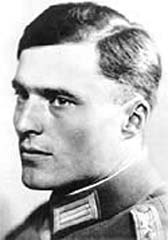
American industrialist who succeeded Cordell Hull as Secretary of State in December 1944; appointed chairman of the War Resources Board at the start of the war, becam Director of the Office of Production Management from January 1941, where he was responsible for the conservation of raw materials for war production; later in 1941 was appointed administrator of the Lend-Lease Program and was subsequently President Roosevelt's special adviser on war production; in October 1943, Roosevelt appointed him Under Secretary of State; in this office he was largely responsible for the organization of the Dumbarton Oaks Conference, which brought together delegations from Britain, Russia and China to discuss proposals for a world-wide organization, later called the United Nations; Secretary of State from November 1944, acted as President Roosevelt's chief adviser at the Yalta Conference and attended the San Francisco Conference as chairman of the delegation; in July 1945, became first US delegate to the United Nations.

US commander of American and Chinese troops in the China, Burma, India Theater of operations; a staff instructor at West Point from 1906 to 1917, was sent to France on the United States' entry into World War I to serve as a Combat Intelligence Officer with the American Expeditionary Force; after the war, took the unusual decision to study Chinese and spent 3 years in Peking in the early 1920s and a further 3 years at Tientsin; between 1933 and 1939, was again in China as Military Attaché; immediately after Pearl Harbor, Gen Marshall, impressed by Stilwell's command of the language and understanding of China's difficulties, appointed him to command US troops in China, Burma and India with an urgent brief to improve the training of Chiang Kai-shek's Chinese forces. His personality was complex and abrasive, and in his relations with the British (whom he generally disliked) and the Chiand Kai-shek leadership circles (which he generally despised) he fully earned the name the US press accorded him of Vinegar Joe; yet to the British he was a loyal and effective ally and his belief in the qualities of the Chinese soldier sustained him through long periods of defeat and withdrawal. Acting as the nationalist leader Chiang Kai-shek's chief of staff, newly promoted to lieutenant general, commanded the 5th and 6th Chinese Armies attacking north and central Burma in an attempt to stem the rapid Japanese advance in early 1942; despite some local successes, was unable to hold Lashio, southern terminus of the Burma Road, the logistic lifeline to China; though the Allies would later construct a bypass link, the loss of Lashio force British and his Chinese forces to fall back into India and Yunnan. In October 1942, a reorganization of the command structure in Southeast Asia (SEAC), called upon him to act simultaneaously in several roles; was at the same time a US general responsible to the US Chiefs of Staff, principal adviser and 'minder' of Chiang Kai-shek and deputy to the Supreme Allied Commander in Southeast Asia, Lord Louis Mountbatten; the conflict of responsibility thus imposed upon him was a dilemma he was unable to resolve; frustrated by the labyrinthine intrigues of the Chinese leadership as well as the appalling logistical and communications difficulties imposed by the remoteness of the Chinese theater, was increasingly at odds with Chiand, as well as other colleagues such as Maj-Gen Chennault; in 1944, his Chinese command and a small US force, known as Merrill's Marauders, made a successful advance on the Japanese-held airfield at Myitkyina in northern Burma, but Chiang's intrugues were by now bearing fruit; In October 1944 he was recalled to Washington on Chiang's insistence. It is unlikely that Vinegar Joe Stilwell will ever be considered a great commander, but his political contribution to keeping China in the war was crucial and his abilities as a training general were fully realized between 1942 and 1944 in his reorganization of the Chinese armies under his command; died on October 12, 1946, embittered at what he considered lack of official recognition for his efforts in Southeast Asia.
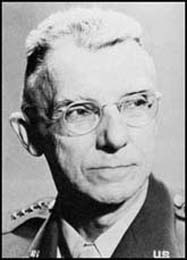
was 72 when President Franklin Roosevelt asked him to serve as secretary of war in July 1940; had been a field artillery colonel in World War I; district attorney, secretary of war under President Herbert Hoover (1929-33); oversaw mobilization and conscription, established the autonomy of the US Army Air Corps and staunchly supported the Lend-Lease program and increased aid to Britain; known in Washington as 'the Colonel', was responsible for arming US merchant ships against Axis attacks, backe the Allies' 'Germany first' strategy and recommended the use of the atomic bomb against Japan.
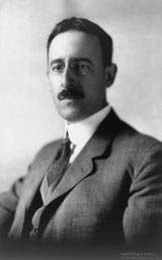
higly regarded British commander from 1943 of the XXXIII Indian Corps, which participated in some of the most important and difficult fighting in India and Burma between 1943 and 1945; having advanced from Dimapur to raise the siege of Kohima in April 1944, XXXIII Corps then drove on at great speed throught monsoon weather to join up with troops of IV Corps under General Scoones and reopen the road to Imphal; pressed on by Stopford, XXXIII Corps the pursued Japanese forces over mountainous terrain to central Burma, taking part in the recapture of Meiktila and Mandalay in March 1945.
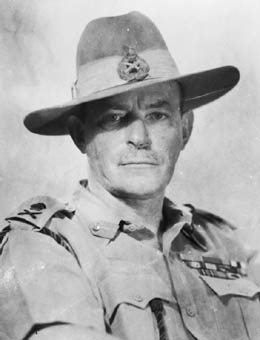
the leading German paratroop commander of the war, had joined the Luftwaffe upon its establishment in 1935 and was charged with the formation of an airborne division; at the start of the German Western Offensive in May 1940, his troops achieved remarkable success in Belgium and the Netherlands; using gliders and specially developed lightweight weapons, they were dropped behind the defenders' lines, spreading great confusion and securing vital bridges before they could be destroyed; was one of the few casualties of the operation; was wounded in the head and put out of action for the next 8 months. The following May, commanded 11,000 parachute and mountain troops in the audacious airborne capture of Crete, but heavy losses sustained in the operation dampened Hitler's enthusiasm for offensive actions using paratroops. had originally proposed the attack on Crete and subsequently pressed for further assaults on Mediterranean targets, particularly Malta, but none was ever sanctioned; instead, his forces were used as a highly mobile tactical reserve in the defense of Sicily, Italy and Northwest Europe; respected by Hitler, to whom he was unswervingly loyal, became an important commander of ground forces, leading Army Group G in the defense of Belgium and Germany in 1945.
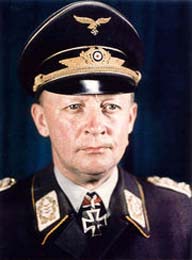
Luftwaffe officer and Chief of Staff 1937-39; in 1940 commanded air operations against Norway, becoming C-in-C for the area in May of that year; his Air Fleet Luftflotte V, based in Norway, participated briefly but unsuccessful in the Battle of Britain; later in the war commanded Germany's home defense air force.
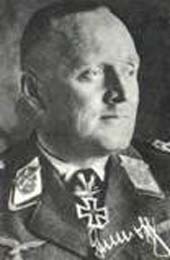
Japanese Army field marshal and Army Chief of Staff from 1940 to 1944, was one of the group of Japanese militarists involved in the political machinations that brought Japan to war with the United States; subsequently directed overall Army strategy until February 1944, when, following the devastating Allied raid on Truk, was dismissed by Premier Tojo, who assumed the command for himself; after the fall of Tojo's government in July, became War Minister in Koiso's newly formed cabinet until its resignation in April 1945; appointed commander of the 1st Imperial Army with responsibility for Japan's home defense in the last, desperate stages of the Pacific War, committed suicide with his wife in September 1945, at the start of the American occupation.
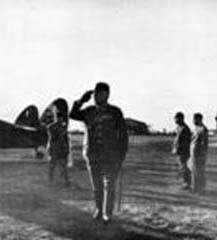
C-in-C of the Japanese Combined Fleet and Chief of the Japanese Navy General Staff in the early part of the century, was an independent-minded political moderate who was appointed Grand Chamberlain and privy councillor to Emperor Hirohito in 1929 and miraculously escaped an assassination attempt during the coup by Army extremists in 1936 that resulted from his anti-militarist stance; in August 1944 was appointed President of the Privy Council; in the following year was increasingly drawn into the political arena as an influential advocate of peace and was asked to form a cabinet in 1945; became Japanese Prime Minister in April, taking over the difficult responsibility of bringing the war to an end whil maintaining control over the Japanese armed forces; resigned as Prime Minister on August 15, following the Emperor's broadcast surrender to the Allies.
